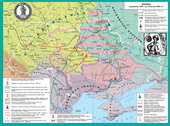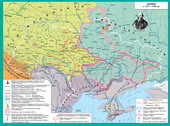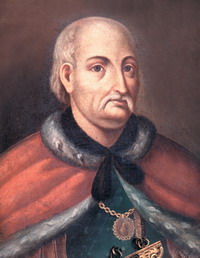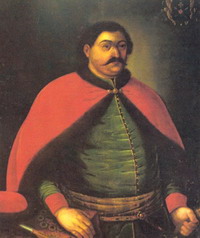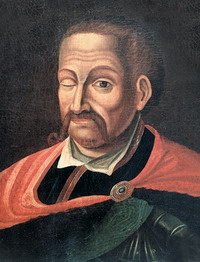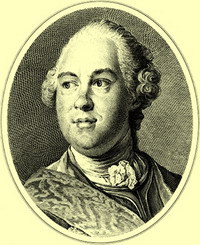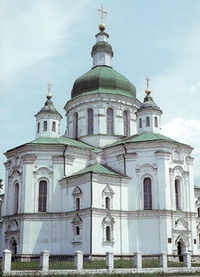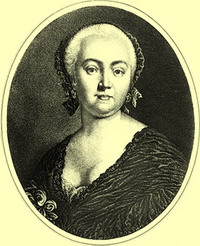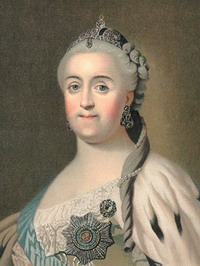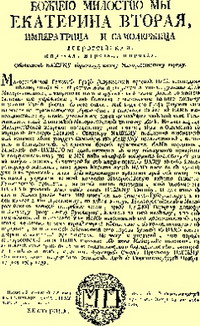UKRAINE AFTER Battle of Poltava. STRENGTHENING colonial policy of Russian Empire
CHRONOLOGY OF EVENTS
|
1722-1727 he |
Activities First Little Russia Collegium. |
|
1723 |
Views And Peter Kolomaksky cholobytnyh. Prison acting hetman P. Polubotko in Peter and Paul Fortress. |
|
1727-1734 he |
Hetman Danylo Apostol. |
|
1734-1750 he |
Activities Board Hetman's government. |
|
1735-1739 he |
Russo-Turkish War. |
|
1750-1764 he |
Hetman Kirill Razumovsky. |
|
1762-1796 he |
Reign of the Russian state of Catherine II. |
|
1764 |
Liquidation hetmanship Catherine II. |
PERSON
John Skoropadskyi was born in 1646 in Uman, in the Cossack petty family. In sources preserved testimony of the grandfather of the future hetman - Fyodor. He participated in the National War and, family legend, was killed in the battle Zhovtovods'ka. About Hetman father - Elijah also left little evidence. From sources learn that in the middle of XVII century. He lived in Uman with three sons: John, Basil and Paul. After the death of his father John and Basil (Jr., Paul, got into the Tatar captivity), had suffered many disasters, were forced to move to the Left Bank. Work at the new place, John was appointed hetman in office. Since starting his long climb official positions. It is known that the sympathetic Skoropadsky Mazepa. After the rebellion antymoskovskoho Mazepa Starodubsky Colonel, as noted above, could not support the hetman, since Moscow's troops entered Starodub. Becoming Hetmanm, he never tavruvav Mazepa "traitor" as required formal communication, revealing in a way favorable to its former hetman. He died at the Deaf in 1722
Life way Paul Polubotko is not much different from the fate of many other members of the Cossack elite. The exact date of birth unknown acting hetman. Researchers believe that he was born about 1660 came from the old Cossack Hetman kind. He graduated from Kiev-Mohyla Academy, knew foreign languages, he made love in poetry. From 1706 - Chernihiv colonel. He has held senior positions Cossack. In 1708 was one of the contenders for the hetman and probably would have mace, if elections were held in an old Cossack tradition. During the uprising against Muscovy Mazepa Polubotok not support it. From Hetman Skoropadskim lived in harmony. Evidence of good relations between them is the fact that Polubotok by Hetman Skoropadsky became the second person in the Ukrainian state. After the death of Paul Skoropadsky Polubotok - the only candidate for the hetman. In October 1723 acting hetman Polubotok as the king was imprisoned in Peter and Paul Fortress, where prosydiv until his death December 18, 1724
Danylo Apostol was born in 1654 in petty Cossack family. His youth had not saved the information. Unknown place and also training future hetman. Because Daniel was a person educated Apostle, suggest that he, like many other sons Cossack, he studied at the Kyiv Mohyla Academy. For certain unknown circumstances and when the Apostle Daniel began his military service. But in 1682 his 28-year-old Cossack Mirgorodsky elected colonel. He kept this government, under some assumptions, intermittently, for 45 years. The age at which the Apostle was elected colonel, and his stay in this government - a record of the history of the Hetman. He participated in campaigns against the Turks and Tatars, and took the fortress Hazikermen Ochakov. In October 1708, together with Mazepa went to a meeting with Swedish King. But less than a month was unexpected: booster secessionist policy Mazepa Daniel Apostle brought the king repentance. In 171923 Danylo Apostol took part in writing Kolomaksky cholobytnyh. Before putting his signature, has made significant changes. He was one of the richest rulers Hetman, earned fame and merit careful owner. Hetman was elected in 1727 Given the intensification of colonial policy of the Russian Empire on Ukraine's sovereignty remains advocated Hetmanate. Died 1734, buried in the church built by his expense in Mhar in Poltava.
Share
Kirill Razumovsky (1728-1803) - the last Ukrainian hetman was happy. Born March 18, 1728 in the village. Chernihiv plowshares into a family of Cossack Grigory Razumovsky. In the 14-year age he got to the king's palace. Alexey Razumovsky took care of his younger brother a good education: he seized a bookish wisdom under the tutelage of the best contemporary teachers and educators, and in 1743 went to study abroad. While visiting Germany, France, Italy, Cyril spring 1745 returned to St. Petersburg, where he was already waiting count title. In 1746, 18 year old boy, Kirill Razumovsky became president of the Russian Academy of Sciences and the hetman's mace was in the age of 22. In the period of Hetman Razumovsky more lived in St. Petersburg than in Ukraine, which managed the affairs of the hetman's office, headed by H. thermal. In 1762, the Ukrainian Hetman actively participated in the Domestic coup Catherine II. After the liquidation of Hetman Razumovsky a chas been a member of the State Council (1768-1771). Subsequently withdrew from public affairs, lived in St. Petersburg, abroad, the estate near Moscow, Peter Rozumovsky. Last 9 years of life spent in Baturin, where he died in January 1803
Terror UKRAINE after Poltava battle
After the battle of Poltava Ukraine wave king of terror.
- punitive action related to all aspects of life and had an expression is various - from the death penalty ban Mazepas to print books in Ukrainian.
- Many in the administration officer was deprived estates and government posts.
Instead - important positions were provided to officials not to Ukrainian-patriots, and with Russians, Germans, etc., and tiy Ukrainian officers who maintained loyalty to the king.
- Many officers were arrested and exiled to Siberia. Russia and sent to the family Mazepas, and arranged themselves in a real hunt all European countries.
- example, a nephew of Andrew Mazepa Voinarovsky was arrested in Hamburg in October 1716
- The same fate befell Mazepa General captain Gregory Hertsyka , who was arrested in Warsaw.
- scoured Europe in search of a Soviet agent Philip Orlik and his family.
After the battle of Poltava - Muscovite forces behaved in the Ukrainian lands as conquered country. From their tyranny suffered not only supporters of the hetman, but also civilians.
- extremely difficult test for Ukrainian steel forced channel, construction of fortifications, military "grassroots" campaigns and more. Duzhyh and wealthy peasants often sent to St. Petersburg, Astrakhan, the Caucasus, using cheap labor.
- Thus in 1716 the construction of Volga-Don canal near Tsaritsyn sent 10 thousand Cossacks.
- In 1718 a new department here sent Ukrainian troops. Another division that year built the fortified line above, the Terek in the Caucasus.
- In 1721, the 10 thousand Cossacks were sent to the construction of the Ladoga Canal, and in 1722 they took the new 10 thousand Cossacks.
- number of those who come from such campaigns, ranged from 30 to 60%, the rest of the Cossacks and peasants died from unbearable living conditions, epidemics, injury, etc..
Thus, the tsarist government policy led to the extinction of tens of thousands of Ukrainian people.
After the battle of Poltava - significantly increased attack and at the Ukrainian statehood. In addition to direct pressure, the Russian administration to have a pretext for interference in Ukrainian affairs, provoked hostility among officers and Hetman, between officers and farmers, etc., sought to create the impression that all evil comes from the Hetman and the officers, and all is well - from Moscow.
Hetman Ivan Skoropadskyi. RESHETYLIVSKI ARTICLES
- Hetman Ivan Skoropadsky (1708-1722 biennium) , by tradition, was launched with the signing of papers.
- But Peter refused to do so, explaining his decision to war circumstances.
- After the battle of Poltava, July 17, Skoropadskiy while the Cossack army in the camp under Reshetilovka, appealed to the king of the 14 paragraphs of articles.
- In them he requested to confirm the rights and liberties Hetman and solve many important matters of everyday life.
- In response Peter sent a nominal decree, which does not like the interstate treaty article.
In the royal decree - rights and liberties confirmed in such a way that meet the interests of Muscovy. Subsequently promised dates and articles.
- As to other matters, the king said that during a campaign under the command of Russian generals have to pass not only simple Cossacks, and even the hetman.
- sit Voivod, Peter testified, in Ukrainian cities, as before, in case they do not interfere Ukrainian, excluding the "state" as "treason" (for "treason" rozumilysya any action that contradict the desire of the king).
- important innovation was the appointment of the king's resident Izmailov hetman. He was given the right to exercise control over the Hetman and the Government of Ukraine.
- peculiar attachment to the decree were overt and covert article Hour.
These articles called - ground troops Zaporizhzhya "Little Russian land" , which together with the resident royal hetman had to hold the entire population, including rebels, Cossacks, "in silence and obedience to the Great State "
- Nakazuvalosya also "svoyevoltsiv eliminate" do not allow them to settle in one place, especially at the Sich. Foreign envoys Hetman had to make only with Being. Last obliged immediately to inform the king about the visits and calls and send letters brought by ambassadors.
- In addition, residents had to watch to the Hetman without the permission of the king did not change the structure of military posts in the General Office and not appointed a new colonels vidbyrav not and do not give anyone the estates.
- resident duty was to see that Hetman government informed the king of all their income.
- residence was appointed Hetman deaf, which was located almost on the border with Russia.
- reported that when the hetman maintained two Russian regiments, however, will be available to the resident king.
So no confirmation on which ancient rights and liberties in the decree of Peter I was. On the contrary, the measures introduced, turned the once autonomous Ukrainian state on a typical "suburb of Muscovy".
MEASURES aimed at undermining ECONOMY Hetmanate
Imperial Government has identified for itself the main goal : Hetmanate deprived of economic independence, to subordinate its economic life of Russia's economy and turn to a reliable source of their income. King's activities primarily related to trade.
- At the beginning of XVIII century. Ukraine has traditionally maintained close trading ties with the Central and Western Europe. Peter King sought to block his decrees significant trade routes, forcing the Ukrainian merchant rolls back to Russia.
- such prohibitions and restrictions chooses appropriate Russian government and the importation of foreign goods into Ukraine. Such measures have had to make Ukrainian products to buy instead of his foreign products manufactory young Muscovite.
- inhibited the development of Russian trade and customs policy: set of Russian-Ukrainian border duty not used for enrichment of Ukrainian state treasury, and went to Moscow.
- One of the measures that hindered the development of Ukrainian economy, the Russian government was to sell the Ukrainian territory copper money to gold and silver in circulation remained mostly Russian population, enriched by the Russian state treasury.
- ruining the economy of Ukraine permanent residence in its territory a great Russian army (10 thousand), which detained at the expense of the Ukrainian population.
attack of tsarism ON UKRAINIAN CULTURE
- To finally conquer the Ukrainian, Peter struck education and typography, trying to keep the activity of such powerful cultural centers like Kiev-Mohyla Academy and the Kiev-Pechersk Lavra.
- In 1709 Peter commanded Kiev palatine send abroad all "Polish" (ie right-bank origin) students and report how many students will remain the "Little Russian" - natives of Hetman, and how many monks are teachers from the right bank.
- dramatically worsened the situation of the Church of the Kyiv Metropolis. When he died in 1718 Kyiv Metropolitan, the Russian government banned new vote. In 1722 first hierarchs of the Kyiv Metropolis was given the title of Archbishop of Kiev and Little Russia. Assign it had a church synod, headed by the king in St. Petersburg.
So, Kiev Metropolitanate into a regular diocese of the Russian Orthodox Church.
- destruction of Ukrainian culture and performed by such devious measures as SOLICITATION Ukrainian scientists, theologians, writers and teachers from Kyiv to Moscow and St. Petersburg.
- received high ecclesiastical office, they had spoken and written word to glorify the king and his policies, and Mazepa, and all those like him, dared to speak out against the kings, in every way dishonor.
This is followed by - Feofan Prokopovich, Stefan Jaworski, Gabriel Buzhinskaya and many other talented members of the Ukrainian people.
- From the time of Peter and Ukraine began to export historical monuments, rare books and others. In 1720 the king ordered the governor of Kyiv "to all the monasteries ... inspect and take long brevet, and other original letters, as well as historical books, manuscripts and printed.
FORMATION Little Russian College
evidence of complete annihilation of the state of autonomy of Ukraine was the creation in April 1722 Malorussian board.
- decree was announced April 29, 1722
- It reported on a Little Russian Collegium of six officers of the Russian regiments stationed in Ukraine, led by foreman Velyaminovym.
- Hetman show a submission from the College of Foreign Affairs and subordinated Senate as usual province of the empire.
Brigadier Velyaminov arrived Glukhova July 21, 1722 at led by the Little Russian Collegium relied very wide powers.
- Board took over all administrative leadership of the Left-Bank Ukraine.
Members of the Little Russian Collegium - had to supervise the work Hetman, general and regimental officers.
- They controlled the establishment and collection of taxes to the king's treasury, the quartering of Russian soldiers and officers in Ukraine.
Little Russian - board to monitor the activities of the military office.
- Russian officials followed the distribution of landholdings among officers.
However - Little Russian College was higher appellate authority.
- also Velyaminov had the right in its sole discretion to intervene in any sphere of Ukrainian life as a full owner of the land.
COSSACK ELITE FIGHT ON RESTORATION OF CIVIL RIGHTS UKRAINE
- Imperial decree on the formation of the Little Russian Collegium heavily struck John Skoropadskyi. In Ukraine, Hetman returned from Moscow, where he attended the celebrations on winning the Northern War, very sick.
Feeling loved - death, he instructed the hetman duties Chernihiv colonel Paul Polubotko , which zastupav, and upon a visit to Moscow.
- Paul Polubotok launched activities aimed at restoring order Cossack.
- acting hetman made reform of the court to limit the power of the Little Russian Collegium.
He did - General Court collectively, resolutely fight against bribery and delays in the provincial courts, established the procedure for submission and consideration of appeals.
- In December 1722 Polubotok ordered, so the complaints of people considered inferior to the higher authority of the Ukrainian people, and not submitted directly to the Little Russian Collegium.
- However, despite vigorous measures Polubotko and officers, Peter in April 1723 gave the Little Russian Collegium such an authority that made it to the sovereign Ukraine.
- Ukrainian government with its military General's office was subject to board the Little Russian.
- Numerous petitions (petition), containing the main Ukrainian demand - to elect a new Hetman, the king dismissed.
- Besides new decree in April 1723 he removed from power commander Hetman of the Cossack troops, passing her General Golitsyn, who led the Russian army in Ukraine.
- May 22, 1723 Polubotko the managing general clerk and the judge was summoned to St. Petersburg.
However - acting hetman of the delayed departure, preparing new documents requesting the restoration of civil rights in Ukraine. Were two cholobytni:
- one had to sign general officers and colonels,
- Friend - officers and regimental commanders.
In June - Polubotok Paul went to the north and 3 August reached Petersburg.
- After leaving acting hetman movement for expanding the autonomy of the Cossack state was headed by Colonel Mirgorodsky Danylo Apostol.
- particular, he has made the conclusion Kolomaksky cholobytnyh - the articles signed in mid-August - early September 1723 on Kolomak was that in Poltava region, representatives of the Cossack.
- In them, as in previous articles, the officers complained of poverty Cossacks and peasants by military obligations, crop failures and burdensome fees Malorussian board.
Articles - again raised the question of exemption from taxation of estates officers.
- It was also about shortcomings in legal proceedings that their Cossack government to remedy without outside interference.
- Finally, the officers requested permission to choose Hetman.
Signed - Kolomaksky cholobytni Danylo Apostol submitted to the General Military Chancellery.
- Officials learned of plans Polubotko Paul, decided to immediately send to the embassy of the Russian capital with which to convey the article.
However - Cossack envoys detained Little Russian College. Then to St. Petersburg was secretly sent a military clerk John Romanovich.
- Sunday morning November 10, 1723 Envoy General Military Chancellery Kolomaksky cholobytni personally handed the emperor Peter II
- After presenting "cholobytnyh" by order of Peter was arrested its most active authors.
More than a year - prolonged interrogation Ukrainian officers in St. Petersburg.
- against acting hetman was initiated legal proceedings on charges of treason - of secret communication ' yazkah with Hetman in exile Philip Orlyk.
However - trial never took place because December 18, 1724 in Petropavlovsk casemate Polubotok Paul died.
RESTORATION Hetman. Danylo Apostol
- Fighting Cossack hetman vote for the resolution was ineffective: the death of John Skoropadsky and acting hetman Hetman Pavlo Polubotko elections occur.
Little Russian Ukraine - board rules. However, there was some easing of tsarist policy of Ukraine. It was coupled with the death of Peter in January 1725
- February 8, 1725 Catherine and was released from custody of the Ukrainian officers who were imprisoned along with Polubotko.
Causes Recovery Hetman
- summer of 1727 has increased tension in Russian-Turkish relations. Russia started preparations for another war. The government of Peter II, relying on military assets Cossacks sought to attract to their side Cossack officers.
- was removed and allowed to board the Little Russian elections Hetman.
- Not role in making that decision played a personal interest Menshikov - the person leading the court for a minor Peter II.
- Menshikov hoped in this way to expand the already vast estates in Ukraine.
- a situation, the sole and undisputed candidate to the hetman was Danylo Apostol.
- In elections held October 1 in Deaf and thrown off the ceremony rather oath in 73-year-old Apostle voted unanimously. Contracting articles, as well as from Skoropadskim, was signed.
Thus, its main business Apostle saw the signing of the traditional Russian-Ukrainian agreement.
- To this end, the newly elected Hetman decided to take a trip to St. Petersburg for the coronation of Peter II.
In the Russian capital - Ukrainian hetman put great efforts to rectify the matter: filed written petitions, met with influential dignitaries.
In early March - Danylo Apostol began talks with the president of the Foreign Board of Count Golovkin, gave him a prepared paper. Only in August Hetman received in response to their proposals "Rishytelni points". They had a form of imperial government decree hetman.
"Rishytelni clauses" in 1728
- accordance with the "new contract" hetman pozbavlyavsya negotiate with other countries.
- only allowed to solve the border problems with Poland and the Crimea, but under the supervision of a resident of Russia.
- the military governments were elected by the people of the house, however they are approved by the emperor.
b. A lower - officers asserted hetman. The highest judicial body became General Court.
- It consisted of three Russians and three Ukrainian hetman and ocholyuvavsya, but the "chief judge" was considered the king.
Cancelled - ban Russians to buy land in Ukraine, although it noted that the new landowners have to obey the Ukrainian administration.
New articles - significantly restrict the already curtailed the rights and liberties Ukraine.
- As for Hetman Apostol, the rights granted to him even less than Skoropadsky.
So, "Rishytelni items" were not the bilateral agreement. They had the appearance of order, normative act of supreme power of the Russian Empire. The document was intended to regulate the internal life Hetmanate as part of a single state.
Reform Danylo Apostol
view of the real circumstances Apostle Daniel started to implement reforms aimed at streamlining the internal life of Hetman.
- reforms conducted in the areas of justice, finance, land affairs, trade and so on.
- With a view to resolving the land of the Apostle during 1729-1731 he held a general investigation of the estates. As a result of such event in the state were returned to use a lot of land, arbitrarily seized from private ownership.
- Much effort was launched to revitalize the Apostle Ukrainian trade. Getman was able to reverse many restrictions and harassment, introduced by Peter I. For example, with the assistance of Ukrainian Danylo Apostol merchants back right to export goods to Western markets was again established trade links with the Crimea, etc..
- pursuing reform of Finance, the Apostle first installed the exact budget of public expenditure, with the costs among singled out the section that was used for the maintenance of Cossack administration hired troops, artillery and more. Getman also identified ways of filling the state treasury Hetmanate.
- Changes in legal proceedings related to reforming the courts, the introduction of mandatory documents, reduce to a collection of laws that were used in the Ukrainian judicial system. Regimental courts were divided into two kinds: for business critical and criminal (ie for crimes) and for small cases. Centesimal and rural courts turned into collegiate (shared, common).
- addition, overcoming resistance to the Moscow government, the Apostle resumed Hetman right to appoint general officers and colonels.
- By Hetman Apostol could significantly reduce the number of Russians in the Ukrainian administration. It was limited to six regiments of Russian in Ukraine.
So, Daniel was able to temporarily slow down Apostle conversion process Hetmanate administrative unit in Russian Empire, vtrymavshy, at least for a while, those rights and freedoms that have remained in Ukrainian.
establishment of a new Host
1734 more than 30 thousand Cossacks of the territories which belonged to the Crimean Khan and Kamyansko Oleshkovsky Zaporizhzhya Sich returned and 7 km from the former Chortomlyk (Old) Host laid New Sich.
New - January stood on the shores of the underground, which merged in Dnipro next Chortomlyk. That's why this January also called Pidpilnenskoyu.
- Zaporozhian formed the original administrative-territorial system. Land was divided into eight palankas - districts.
- total land Zaporozhian Host covering a huge area of steppe Ukraine.
- During New Sich extremely quicken economic activity Cossacks. As in ancient times, the Cossacks showed their individuality soldiers-farmers.
- economic climate in Zaporozhye were then defend or not. But there was no forced labor, serfdom. This fact attracted as ever, numerous fugitives from all over Ukraine, even because of its limits.
- The farm occupied a significant place winterers officers and wealthy Cossacks. Most of the products went to market.
ACTIVITIES "BOARD Hetman's government"
After the death of Danylo Apostol 1734 election of a new hetman frustrated. The Russian government, limiting the statehood of Ukraine, ordered the government to implement Left Hetmanate Board Hetman's government.
- this institution consisted of six people - three Russians and three Ukrainian, but all the fullness of power belonging to the Russian prince Alexei Shahovskomu.
- The work of the Board of Hetman's government had to follow "items Rishytelnymy" Hetman Danylo Apostol.
- According to the king's diploma, the Board of Hetman's government had to act to elect a new Hetman.
- However, when it is intended to elections Hetman, not stated in the document.
Instead - Shahovskyy prince, according to tradition, received secret instructions which he nakazuvalos in any way to convince Ukrainian that all their woes - by Hetman negligent, and therefore no need to rush to elections.
For - diminishing Ukrainian officers in the manual advised strongly encourage the Russian-Ukrainian marriages.
- Board Hetman's government acted in 1750
- marked this activity is arbitrary disregard of the rights of all segments of the Ukrainian people, the deteriorating economic situation worsening domestic situation.
- particularly difficult period came in years when the Empress of Russia was Anna Ioannivna. Suspicious and cruel, she introduced the Last office - "sovereign's words and deeds".
- Nyshporky undercover office under pain of death obliged to inform the population "word and deed, ostensibly directed against the Empress. Libel became awkward time only basis for the political accusations that pulled at the death, torture, exile.
- In 1735 the Russian government has significantly reduced the registry Cossack troops. According to the order, left bank Cossacks were divided by the wealthy - Cossacks elected and impoverished - helpers. impoverished Kazaks who could not support themselves during the campaign, deleted from the registry.
But the heaviest burden - for Ukraine was started by Russia's war against Turkey 1735-1739 biennium, since the Ukrainian population maintained the Russian army and Cossack regiments were directly involved in campaigns.
- Russian military leaders, including Minih, neglect of material resources of Ukraine did not cared, and the fate of the Cossacks, who killed thousands.
- In such circumstances, the Board officials Hetman's government does not care about the advancement of Ukrainian speaking obedient tool of the Russian government.
- situation improved a little Left Bank Ukraine, where Russia went down to the throne of Elizabeth. Daughter of Peter Elizabeth took the imperial throne in November 1741 as a result of the Domestic coup.
- It was not peculiar to a specific charity, and some changes in the position of Ukraine conditioned a number of internal and external political circumstances.
- played a certain role, undoubtedly, Ukrainian environment Empress: her husband was a Ukrainian Alexei Razumovsky. That is why the court of Elizabeth appeared on all Ukrainian fashion: there was a lot of Ukrainian singers and Bandura, submitted to the Domestic banquets Ukrainian dishes etc..
- While the empress in Kiev in 1744 Cossack officers requested to allow elections hetman. Elizabeth did not object, but gave no specific commitments.
Therefore, the case dragged on election Hetman another six years.
RESTORATION Hetmanship 1750 Getman Kyrylo Rozumovs'kyi ITS ACTIVITIES
Recovery Hetman in 1750 was caused by:
- position officers have consistently demanded restoration of Hetman of the imperial court.
- Increase Ukrainian dissatisfaction with their economic situation and the escalation in this regard, the internal situation in Hetman.
- threat of war against Prussia and the likely need to use in case of such a war capabilities Hetmanate.
- need to restore the economic and strategic potential of Ukraine to be used in future wars against Turkey.
- candidate for Empress Elizabeth hetmancy nominated her husband's younger brother Alexei Razumovsky - Cyril. Elections Hetman of Left Bank Ukraine was appointed to February 22, 1750
- Tsar Decree of June 5, 1750 Elizabeth approved Kirill Razumovsky Hetman government.
- March 13, 1751, while in St. Petersburg, Kirill Razumovsky in court church swore allegiance to the empress, Elizabeth received from the hands of the hetman's mace and other jewelry.
- Only in mid-July 1751 the newly elected Hetman arrived Glukhova.
Kirill Razumovsky measures to restore the independent actions of state administrative bodies Hetmanate
- In October 1751 the power of hetman was given the Sich. Back Hetmanate and Kyiv.
- Relations with Left-Bank Ukraine again pinned to the College of Foreign Affairs.
- Kirill Razumovsky started without agreement with Russian officials to appoint colonels and distribute land.
- increased positions Cossack, who was given the right to manage the absence of Hetman Hetmanate. Regular was convening in Hlukhiv officer council.
However - pozhvavlyuvalosya economic life. Restoration began Baturin, which was returned to the status of capital of the Cossack, and Glukhova, which contained the residence of the hetman.
- Getman seek unto measures that restrict the arbitrariness of the Russian officials who were in Ukraine. In particular, without permission to arrest Ukrainian Hetman prohibited, except criminals.
- separate action plans Hetman contradicted the imperial government that did not wanted to strengthen Ukrainian autonomy. Therefore, despite the great influence at court Cyril Razumovsky Empress, 1754 from ' appeared a number of regulations that restrict the power of the hetman.
- Rozumovs'kyi was forbidden to appoint colonels, and only allowed to propose candidates.
- In response to a request to restore the independent foreign relations Left Bank Hetman Razumovsky received categorical refusal.
- subject to special control financial affairs Hetmanate.
- firmest measures Kirill Razumovsky, used to reconstruct the life Hetman, fell to 60-ies of XVIII century. Returning to Glukhova after another long trip to St. Petersburg and Moscow in early 1760, the hetman Hetman visited all the shelves. The trip convinced him of the necessity of significant changes in the activity of administrative bodies.
- first to face justice reform. back to Coll Hetmanate for revision. However, the complete systematization of Ukrainian laws and failed last hetman.
- Kirill Razumovsky judicial reform also included changes in the activities of the military court.
- universals in 1763 Hetman allowed regiment offices and requestor-memorialist apply directly to the General Court. Thus a system of justice were brought General office and significantly reduce the number of courts.
- also envisages the creation of new judicial institutions. On the territory of each regiment zaprovadzhuvalosya two county and two chamberlain courts. Also created hrodski courts. Following universal Razumovsky in cities with a circle or friends znachkovyh centesimal elect officers began Voznyy.
- Ukraine proposed to divide the 20 judicial districts.
Hetman Attempts to revive the former system of justice of the Commonwealth proved its commitment Hetmanate convert from military to civilian gentry state.
However - Kirill Razumovsky failed attempts to establish hereditary hetman. In petty happy convened in late 1763, was approved 23 items that formed the basis cholobytnoyi addressed the Empress of the request to consolidate, after the hetman Razumovsky.
- reform measures Kirill Razumovsky not spared and the army: shelves have become a regular. Cossacks dressed in uniforms.
- Big plans matured Hetman on culture and education. In particular, he planned to open in Hetman two universities. First - update on European such as Kyiv-Mohyla Academy. Another university expected to open in the Hetman's capital - Baturin.
Razumovsky removal from power. Liquidation hetmanship
About Razumovsky - action to strengthen the Hetman's power, it became known in St. Petersburg. With particular indignation new Empress Catherine II taken the news of the desire to make a hetman hereditary chiefs.
- Kirill Razumovsky immediately summoned to St. Petersburg. The requirement of Catherine II was imperative - to renounce the Hetman's mace. Within 10 months of Ukrainian Hetman, using his connections at court, trying to somehow settle the case. And Empress remained steadfast, because no person Kirill Razumovsky Hetman was the cause of elimination. It was a logical measure of the imperial government that sought the ultimate elimination of the Ukrainian state - Hetman.
So in October 1764 Kirill Razumovsky had to make a hetman's authority.
- imperial manifesto of 10 November and the Senate's decree of November 17, 1764 Kirill Razumovsky Hetman denied. Instead, to control the Left Bank Ukraine and Zaporozhye was founded Little Russian Collegium led by its president and governor-general Peter graph Room ' yantsevym.
 English
English
